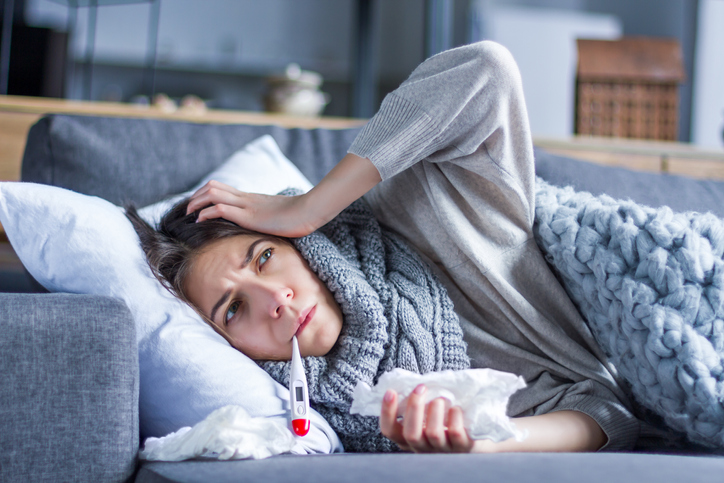
Every person on this planet living with diabetes must know his or her sick day rules. What exactly do I mean by sick day rules? It’s having a game plan for how to manage your diabetes when you are sick. It’s especially important for people using insulin.
First off, if you find yourself coming down with coronavirus symptoms, here are some tips (which may vary for each person):
- Contact your healthcare provider to let them know, and ask about steps to get tested.
- It’s important to test your blood sugar every 2-3 hours and know what to do with the results. For people taking rapid-acting insulin such as Afrezza, Humalog (lispro), Novolog (aspart), or Apidra (glulisine), taking small-to-medium amounts of extra insulin throughout the day may be in order to keep the blood glucose level from climbing above 200 mg/dL. The amount of insulin needs to be individualized according to your sensitivity and normal amounts that you take when you are not sick. If you have type 2 diabetes and are on oral medication only, your sick-day rules will probably not include insulin injections.
- Rest and drink plenty of fluids. If you’re having trouble keeping fluids down, take small sips every 15 minutes or so to avoid dehydration. If your blood sugars are low drink things like 7-UP, Sprite, or Gatorade and diet drinks if your blood sugars are high.
- Take Tylenol for a fever and other OTC medicines as necessary. Keep in mind that some OTC meds like cough syrups that contain sugar and some decongestants may affect blood sugars. Some CGM sensors (Dexcom G5, Medtronic Enlight and Guardian) are affected by acetaminophen (Tylenol) so you will want to check with finger sticks to ensure accuracy.
- If your symptoms worsen and your breathing becomes difficult, have extremely high fevers or cannot old anything down, you need to seek medical attention.
- Do not withhold your diabetes medication because your appetite is down and you are eating a lot less than normal. In times of illness or stress (emotional or physical), your body normally becomes resistant to the glucose-lowering effects of insulin and/or oral medications, thus increasing the medication requirements and your blood sugar level.
The recommendations below are primarily for people with type 1 diabetes to treat DKA or diabetic ketoacidosis early to avoid an emergency room visit and or a hospitalization. The primary cause of DKA is a lack of enough insulin. The most common situation is when the infusion line of an insulin pump comes out without the individual being aware. Another situation is when someone gets sick with the flu and just cannot keep up with enough insulin since medical stress raises the insulin requirements.
Symptoms of DKA are:
- Excessive thirst or a very dry mouth
- Frequent urination
- High blood sugar levels
- High keytone levels in the blood or urine
- Dry or flushed skin
- Flu-like symptoms (tired, weak, aches)
- Nausea, vomiting or abdominal pain
- Difficulty breathing or rapid breathing
- Fruity odor on breath
- Confusion
If you have a home ketone meter, check your blood ketones every 4-6 hours and whenever blood glucose is above 250 mg/dL.
If your blood glucose is higher than 250 mg/dL:
- Check to make sure the pump, infusion set, tubing, and reservoir/cartridge are working correctly
- If the pump/infusion set is working correctly, give a correction bolus with the pump
- Check your blood glucose in 1 hour
If your blood glucose is still high (> 250 mg/dL) 1 to 2 hours after the correction bolus:
- Check your urine or blood for keytones with a ketone meter
- Recheck the infusion set and site
If your ketone levels are moderate (0.6-1.5 mmol/L) to high (> 1.5 mmol/L) or your blood glucose is rising:
- Inject a correction dose of rapid-acting insulin by SYRINGE or PEN (not by pump)
- Change the pump cartridge, tubing, and infusion set, and use a new insulin vial
- Check blood glucose every hour until it returns to normal
- Drink plenty of noncaffeinated fluids to avoid dehydration
- Consume 30 grams of carbohydrate, and give the appropriate amount of insulin if your glucose level in is the normal or low range. Taking in carbohydrates IS VERY IMPORTANT to turn around and treat DKA. It turns off the body’s drive to produce ketone bodies for energy, which happens when there is not enough insulin around.
Call your healthcare provider or go the emergency department if you have high ketones, nausea and vomiting, or trouble breathing. It’s a good idea to have all of your doctor’s phone numbers on hand – including how to reach them at night, on weekends and holidays.
Sick day rules are extremely important if you get medically ill for any cause. Being knowledgeable about how to recognize and treat yourself at home will help you prevent a totally unnecessary trip to the ER or hospitalization.


Thank you for the reminders on what to do when sick. I’ve had type 1 for 47 years and am very susceptible to DKA.
You’re welcome Keith – stay well!